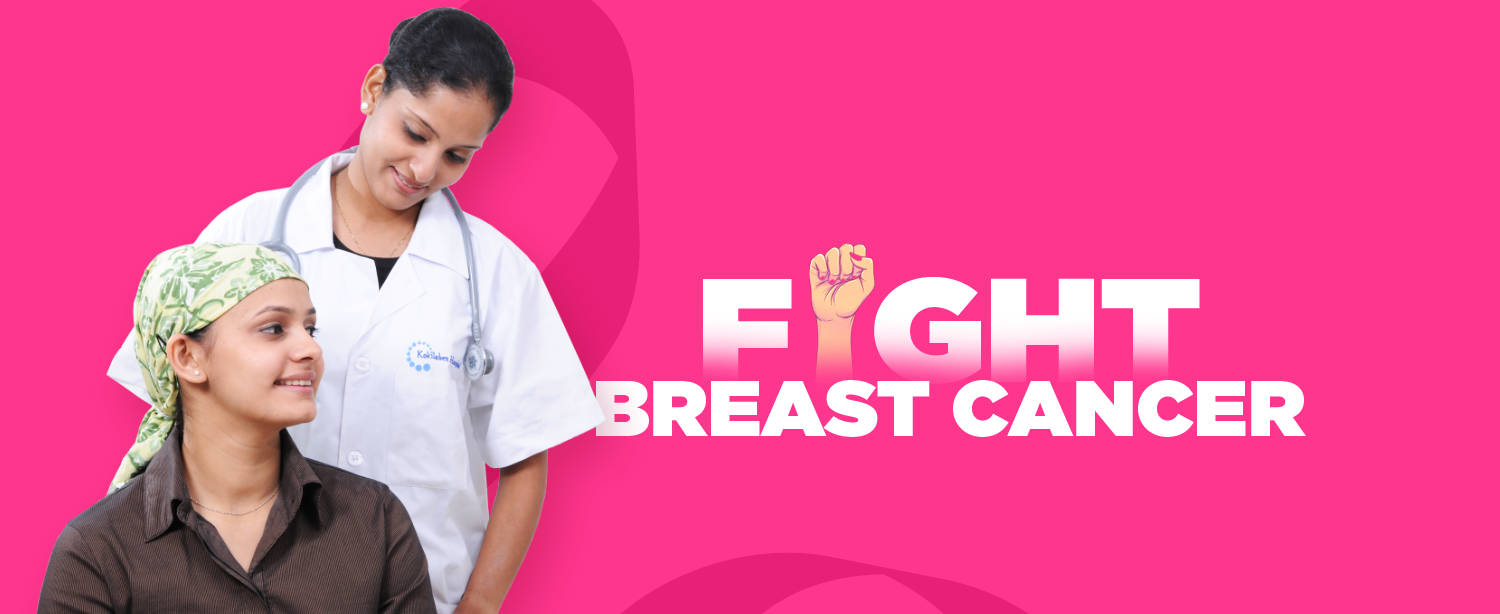What is Breast Cancer?
Breast cancer is an uncontrolled growth of breast cells. Cancer occurs as a result of mutations, or abnormal changes, in the genes responsible for regulating the growth of cells and keeping them healthy. These abnormal cells keep dividing without control or order and form a tumor. A tumor can be benign (not dangerous to health) or malignant (has the potential to be dangerous). Malignant tumors are cancerous. If left unchecked, malignant cells eventually can spread beyond the original tumor to other parts of the body. Breast Cancer is a malignant tumor that develops from cells in the breast.
Breast cancer can have an impact on many aspects of your daily life. It is essential to seek treatment and be updated with the latest breast cancer breakthroughs. Everyone copes with their diagnosis differently and also responds differently to the treatment.
Know the symptoms:
Be vigilant about breast cancer detection. If you notice any changes in your breasts, such as a new lump or skin changes, consult your doctor immediately. Depending on your personal history and age, begin mammogram screenings also after the age of 40 years or earlier if needed.
Initially, breast cancer may not cause any symptoms. A lump may be too small for you to feel or notice on your own. Do keep a note of any unusual changes like below, as they may be a symptom of breast cancer:
- swelling of all or part of the breast
- skin irritation or dimpling
- breast pain
- nipple pain or the nipple turning inward
- redness, scaliness, or thickening of the nipple or breast skin
- a nipple discharge other than breast milk
- a lump in the underarm area
Breast cancer prevention: How to reduce your risk
Adopt healthy habits, understand what you can do to reduce your breast cancer risk. Here are some ways to reduce your risk:
- Limit alcohol intake – The more alcohol you drink, the greater your risk of developing breast cancer. Limit yourself to less than 1 drink per day as even small amounts increase risk.
- Quit Smoking – Studies suggest a link between smoking and breast cancer risk, particularly in premenopausal women.
- Control your weight – Being overweight or obese increases the risk of breast cancer. This is especially true if obesity occurs later in life, particularly after menopause.
- Be physically active – Physical activity can help you maintain a healthy weight, which, in turn, helps prevent breast cancer. For most healthy adults at least 150 minutes a week of moderate aerobic activity or 75 minutes of vigorous aerobic activity weekly is recommended along with some strength training.
- Breast-feed – Breast-feeding might play a role in breast cancer prevention. The longer you breast-feed, the greater the protective effect.
- Limit dose and duration of hormone therapy – Combination hormone therapy for more than three to five years increases the risk of breast cancer. If you’re taking hormone therapy for menopausal symptoms, ask your doctor about other options.
- Limit radiation exposures – Medical-imaging methods, such as computerized tomography, use high doses of radiation. Avoid unnecessary radiation exposures as they are linked to breast cancer.
Things to know about Breast Cancer:
- 1. It does not affect only elderly people– Unfortunately, women in their 20s/30s/40s can also get breast cancer. Awareness is important.
- 2. Early detection is not a cure – Although detecting breast cancer early is associated with a better prognosis, it is not a guaranteed cure.
- 3. It’s not always a lump – Breast cancer most often presents itself as a lump in the breast. However other possible signs should not be ignored like itchiness of the breast, redness or swelling, puckering of the skin, and changes in the nipple.
- 4. Breast cancer isn’t just one disease – Breast cancer has many types and subtypes, such as HER2-positive, estrogen-positive, triple-negative, invasive, non-invasive, and inflammatory breast cancer. Different breast cancers are treated differently.
- 5. Men can get breast cancer too – Another misconception about breast cancer is it is strictly a women’s disease. Even though the vast majority of breast cancer cases are female, men can indeed get it too, their risk is less than 1%.
The greatest misconception that people have about cancer is that all patients eventually die of cancer. It is very important to realise that breast cancer is one of the most curable cancers in the human body. All patients who are cured live a normal life for their entire lifespan. Regular follow ups after the treatment are essential and help identify relapse if any.
Our Breast Clinic at Kokilaben Dhirubhai Ambani Hospital is well-equipped with state-of-the-art radiation machines and day care chemo suites. We have a dedicated service that has been created to specifically diagnose and treat the entire spectrum of conditions affecting mammary gland. If you or a family member is suffering from Breast Cancer do visit us. For further details please refer below link:
https://www.kokilabenhospital.com/departments/clinicsatkh/breastclinic.html


